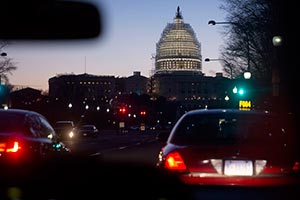Transport Officials, Senators Bemoan Port Delays, Infrastructure Woes

Shipper and railroad executives joined senators at a Washington hearing to bemoan the negative global consequences of West Coast port delays and the U.S. infrastructure investment shortfall.
Legislators and witnesses focused on disruptions from the 50% productivity dropoff at West Coast ports since November during contract talks between the International Longshore & Warehouse Union and the Pacific Maritime Association.
Sen. Deb Fischer (R-Neb.), who is chairwoman of the Commerce, Science and Transportation subcommittee that has jurisdiction over surface transportation, illustrated difficulties in her state for importers and exporters. She spotlighted the experience of an electronics business whose costs have tripled because of the port slowdown.
“A shutdown for even a short period of time would have devastating consequences,” she said.
Sen. Steve Daines, a Montana Republican, highlighted the harm suffered in his state by farmers, who export 80% of their wheat, and an outdoor product manufacturer.
That producer will have to slow production and lay off workers “if something doesn’t happen soon,” Daines said.
From the shipper perspective, Norman Bessac, vice president of international sales for Cargill Inc., said, “The ports are not officially closed, but we are very close to that at the moment”.
He noted that port slowdowns delayed shipments two or three weeks, creating “great uncertainty” because chilled meat shipments only have a 25-day shelf life from the time they are loaded into containers.
In addition, he cited figures such as a loss of $40 million-$50 million in meat export revenue weekly and the potential for $2.5 billion weekly national economic damage if West Coast ports are shut down.
“We must look at this [transportation delay] through the lens of global competition,” he said. “We ignore that at our own peril.”
Katie Farmer, vice president of consumer products at BNSF Railway, joined others in urging a speedy resolution of the port situation.
The backlog there has forced BNSF to cut weekly train departures from Southern California to 30 from 60, or at least 7,500 shipments.
She did note a potential bright spot if a port deal is reached before Chinese New Year, which starts Feb. 19.
Commerce Committee Chairman John Thune (R-S.D.), described the port situation as “an issue that really needs our focus. We can’t afford to drag this on.”
Solving the port situation, he said, means “we can focus more on the infrastructure that needs our attention.”
Other senators and witnesses outlined long-term infrastructure issues.
Sen. Richard Blumenthal (D-Conn.) focused on rail freight needs in his state, noting the lack of rail lines that can handle industry standard 286,000-pound rail cars.
“Our state could become a freight island,” he said, if those cars with 10% more freight capacity can’t reach state businesses.
Economist Walter Kemmsies from consultant Moffat & Nichol said the inland freight network, as well as ports, haven’t kept pace with growing ocean freight shipments and vessels.
He urged the use of dedicated freightways for trucks.
John Grueling, an economic development official in Will County, Illinois, put a price tag on the issue.
The suburban Chicago county, whose logistics center processed 3 million shipments last year, needs $3.6 billion for grade separations and other projects.
Grueling joined Daines and others in urging more infrastructure spending, which is just 2% of gross domestic product, compared with 8% in China.
In addition, he called for steps such as a $2 billion freight program and dedicated freight funding.
He also urged more use of existing programs, such as the Transportation Infrastructure Finance and Innovation Act, which are plagued by lengthy bureaucratic reviews.
“Creating new programs is fine,” he said. “But we need to make better utilization of existing programs.”

